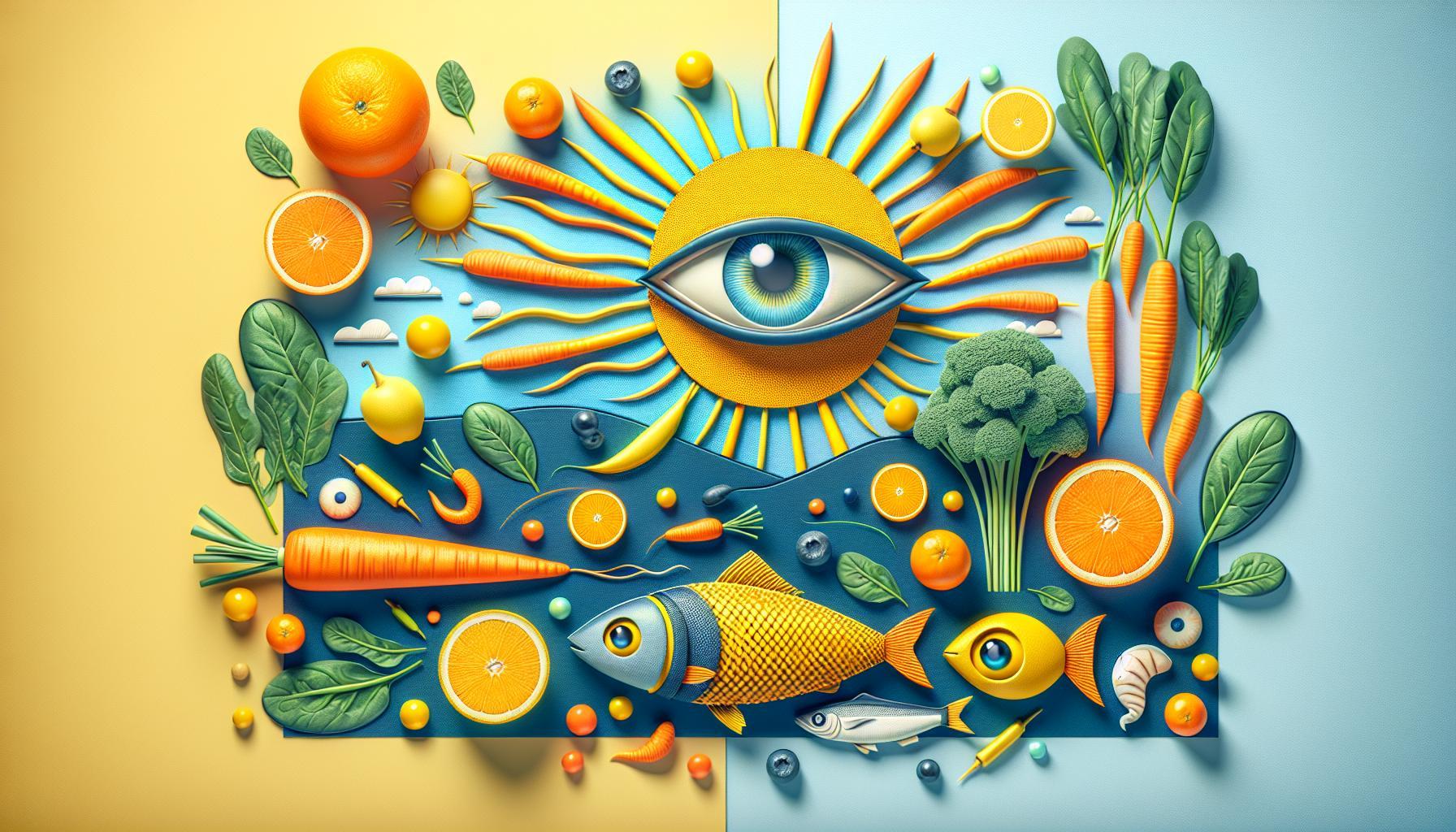Putting food into our bodies is often about satisfying hunger and enjoying the fantastic flavors that cooking offers. But have you considered how your diet impacts your eye health? This blog post aims to guide you through the art of “Eating for Eye Health.” Exploring “Vitamin A and Vision,” “Best Foods for Maintaining Good Vision,” and understanding “The Impact of Antioxidants on Eye Health” forms our core ingredients for this informative recipe. Feed your mind with knowledge and learn how to feed your eyes with the right nutrients for a life full of vibrant visions.
Eating for Eye Health – What’s on Your Plate?
To promote eye health, you must examine what’s on your plate. Consuming a variety of vitamin-packed fruits and vegetables, lean proteins, and healthy fats can combat age-related vision problems such as macular degeneration and cataracts.
The Role of a Balanced Diet and Its Benefit for Vision
A balanced diet not only aids in maintaining a healthy weight but also serves as a protection against sight-threatening diseases. Foods rich in vitamins A, C, and E, zinc, and omega-3 fatty acids aid in preventing vision problems linked to aging.
Foods as a Source of Vitamins for Eye Health
Certain foods are particularly beneficial for eye health due to their high concentration of essential vitamins. For instance, citrus fruits like oranges and lemons are packed with vitamin C, while carrots are known powerhouses of vitamin A.
Super Foods for Super Vision
Examples of “super foods” for excellent vision include green leafy vegetables like spinach and kale, fish rich in omega-3 fatty acids like salmon and tuna, eggs, nuts, beans, and non-meat protein sources.
The Power of Antioxidants for Eye Health
Antioxidants play a vital role in maintaining eye health. Studies have shown that the antioxidants Lutein and Zeaxanthin can reduce the risk of chronic eye diseases, including age-related macular degeneration and cataracts.
Incorporating Antioxidants in Your Diet
Incorporating foods rich in antioxidants like Lutein and Zeaxanthin in your diet is a sure shot way of “Eating for Eye Health.” These nutrients are often found in green leafy vegetables, eggs, and other colorful fruits and veggies.
Avoiding Foods That Hamper Eye Health
Just as essential as incorporating beneficial foods into your diet is avoiding those foods that are detrimental to eye health. High-fat, high-sugar, and high-sodium foods can contribute to vision loss over time.
Foods to Exclude for Better Eye Health
Reduce the intake of processed snack foods, fatty meats, and sugary drinks. Increased consumption of these foods can lead to conditions like obesity and diabetes, both of which can negatively impact your vision.
Hydration and Eye Health
Water plays a vital role for eye health. Staying well-hydrated can prevent dry eye symptoms and maintain the health of your retina.
Perks of Keeping Hydrated
Sufficient fluid intake helps in maintaining the eye’s tear production for perfect vision while also distributing vital nutrients for the overall health of the eye.
Regular Eye Check-ups and Nutritional Support
While a good diet is foundational to eye health, regular eye check-ups are equally crucial. A complete eye exam can detect problems early and prevent vision loss.
Nutrition Supplements for Vision
Supplementation can support eye health along with a good diet. Consult your optometrist to discuss whether you would benefit from specific supplements like Vitamin A, C, E, or eye-friendly minerals like zinc.
Conclusion
In this journey of “Eating for Eye Health,” we’ve seen how a balanced diet, rich in essential nutrients and antioxidants, is vital for maintaining visual acuity. We’ve also learned about the role of hydration, avoidance of certain foods, and the importance of regular eye check-ups. Now it’s over to you! Take this knowledge forth and bring about beneficial changes to your regular eating habits and lifestyle. Remember, our eyes are the window to the world, let’s nourish them wisely.
Frequently Asked Questions
1. What foods are bad for your eyes?
Foods high in fats and sugar, such as highly processed foods, drinks with high sugar content, and fatty meats can harm your eyes’ health.
2. Are carrots really good for your eyes?
Yes, carrots are high in beta carotene, a type of vitamin A that helps the retina and other parts of the eye to function smoothly.
3. How can I strengthen my eyes naturally?
Consuming nutrient-rich foods, staying hydrated, exercising regularly, getting enough sleep and regular eye check-ups can help strengthen your eyes naturally.
4. Do omega-3 fatty acids benefit eye health?
Omega-3 fatty acids have been shown to help with dry eye syndrome and age-related macular degeneration, contributing to overall eye health.
5. How much water should I drink for eye health?
Although there’s no set rule, a daily intake of about 8 to 10 glasses of water should be enough to keep your body and eyes well-hydrated.










